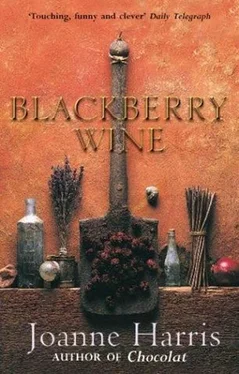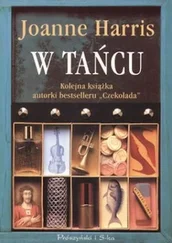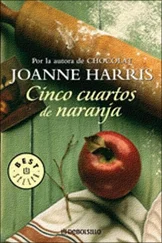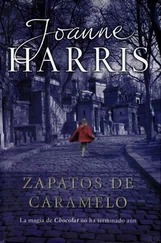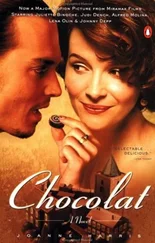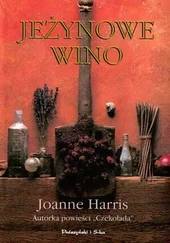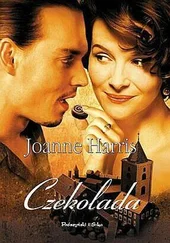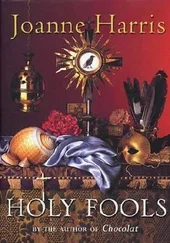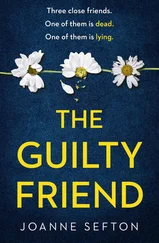Narcisse was suffering from July’s intense heat. His nursery garden was at its most delicate, with gladioli and peonies and camellia just ready to be sold to the shops, with baby vegetables at their most tender and fruit just forming on the branches of his trees. The sudden clap of heat would wither the flowers – each one needed a whole canful of water every day – burn the fruit from the branches, scorch the leaves.
‘Bof.’ He shrugged, philosophical. ‘It’s been looking that way all year. No rain to speak of since February. Maybe enough to wet the soil, héh, but not enough to go deep, where it matters. Business will be bad again.’ He gestured towards the basket of vegetables beside him – a gift for Jay’s table – and shook his head. ‘Look at that,’ he said. The tomatoes looked as large as cricket balls. ‘I feel ashamed to sell them. I’m giving them away.’ He drank his coffee mournfully. ‘I might as well give it up now,’ he said.
Of course, he meant no such thing. Narcisse, once so monosyllabic, had become quite garrulous in recent weeks. There was a kindly heart beneath his dour exterior, and a gruff warmth which made him liked by people who took the time to get to know him. He was the only person from the village with whom Marise did business, perhaps because they used the same workers. Once every three months he delivered supplies – fertilizer, insecticide powder for the vines, seeds for planting – to the farm.
‘She keeps herself to herself,’ was his only comment. ‘More women should do the same.’ Last year she installed a sprinkler at the far edge of her second field, using water from the nearby river. Narcisse helped her carry it and put it together, though she installed the thing herself, digging trenches across the field to the water, then burying the pipes deep. She grew maize there, and sunflowers every third year. These crops do not withstand dryness as vines do.
Narcisse offered to help her with the installation, but she refused.
‘If it’s worth doing, it’s worth doing yourself,’ she commented. The sprinkler was working all night by then – it was useless in the daytime, the water evaporating in midair before it even touched the crop. Jay could hear it from his open window, a dim whickering in the still air. In the moonlight the white spume from the pipes looked ghostly, magical. Her main crop was the grapes, Narcisse said. She grew the maize and sunflowers for cattle feed, the vegetables and fruit for her personal use and Rosa’s. There were a few goats, for cheese and milk, and these roamed free around the farm, like pets. The vineyard was small, yielding only 8,000 bottles a year. It sounded a lot to Jay, and he said so. Narcisse smiled.
‘Not enough,’ he said shortly. ‘Of course, it’s good wine. Old Foudouin knew what he was doing when he put in those vines. You’ve noticed how the land tilts sharply down towards the marshes?’
Jay nodded.
‘That’s how she can grow those vines. Chenin grapes. She picks them very late, in October or November, sorts them, one by one, by hand on the vine. They’re almost dried out by then, héh . But as the mist rises from the marshes every morning, it dampens the vine and encourages the pourriture noble , the rot which gives the grape its sweetness and flavour.’ Narcisse looked thoughtful. ‘She must have a hundred barrels of it by now, maturing in oak, in that cellar of hers. I saw them when I made last year’s delivery. Eighteen months on, that wine’s worth a hundred francs a bottle, maybe more. That’s how she could afford to bid for your farm.’
‘She must really want to stay here,’ commented Jay. ‘If she has money, I would have thought she’d have been only too pleased to leave. I’ve heard she doesn’t get on well with people from the village.’
Narcisse looked at him. ‘She minds her own business,’ he said sharply. ‘That’s all.’
Then the talk turned once again to farming.
SUMMER WAS A DOOR SWINGING OPEN INTO A SECRET GARDEN. HIS book remained incomplete, but he rarely thought about it now. His interest in Marise had gone further than merely the need to collect material. Until the end of July the heat intensified, made worse by a brisk, hot wind which dried out the maize so that its husks rattled wildly in the fields. Narcisse shook his head glumly and said he’d seen it coming. Joséphine doubled her sales of drinks. Joe consulted tidal and lunar charts, and gave Jay specific instructions on when to water in order to achieve the best effect.
‘It’ll change soon enough, lad,’ he said. ‘You’ll see.’
Not that there was a great deal to lose. A few rows of vegetables. Even with the drought the orchard would yield more fruit than Jay could possibly use. In the café, Lucien Merle shook his head in dark relish.
‘You see what I mean,’ he said. ‘Even the farmers know it. There’s no future in it any more. People like Narcisse carry on because they don’t know anything else, but the new generation, héh ! They know there’s no money in it. Every year the crop sells for less. They’re living from Government subsidies. All it takes is for one year to be bad, and then you’re taking out loans from the Crédit Mutuel so you can plant next year. And the vines are no better.’ He gave a short laugh. ‘Too many small vineyards, too little money. There’s no living to be made in a small farm any more. That’s what people like Narcisse don’t understand.’ He lowered his voice and came closer. ‘All that’s going to change, though,’ he said slyly.
‘Oh?’ Jay was getting a little bored with Lucien and his great plans for Lansquenet. His only topic of conversation nowadays seemed to be about Lansquenet and how it could be made more like Le Pinot. He and Georges Clairmont had put up signs on the main road and the Toulouse road near by, which were supposed to encourage the influx of tourists.
Visitez LANSQUENET – sous-Tannes !
Visitez notre église historique
Notre viaduc romain
Goûtez nos spécialités
Most people viewed this with indulgence. If it brought business, good. Mostly they were indifferent, as Georges and Lucien were known for hatching grandiose schemes which never came to anything. Caro Clairmont had tried several times to invite Jay to dinner, though so far he had managed to delay the inevitable. She hoped that he would address her literary group in Agen. The thought appalled him.
That day it rained for the first time in weeks. A fierce rain from a hot white sky, barely refreshing. Narcisse grumbled that, as usual, it had come too late and that it would never last long enough to wet the ground, but in spite of this, it endured late into the night, pouring out of the gutterings and onto the baked ground with lively plashing sounds.
The next morning was foggy. The heavy rain had stopped, to be replaced by a dull drizzle. Jay could see from the waterlogged state of the garden how heavy the downpour must have been, but even without sunlight to dry it out the standing water had already begun to dissipate, drawing the cracks in the earth together, sinking down deep.
‘We needed that,’ remarked Joe, bending down to examine some seedlings. ‘Good job you got these jackapples covered, otherwise they’d have been washed away.’ The Specials were in a cold frame, carefully snugged against the side of the house, and remained unharmed. Jay noticed they were a remarkably quick-growing plant; the ones he seeded first were twelve inches tall now, their heart-shaped leaves fanning out against the glass. He had about fifty seedlings ready to be bedded out, an excellent success rate for such a demanding species. Joe was fond of saying how it took him five years just to get the soil right.
Читать дальше
